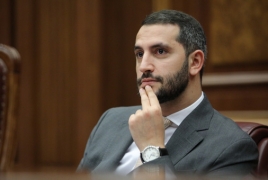
Ruben Rubinyan, Deputy Speaker of the Armenian National Assembly, stated during a panel discussion at the Yerevan Dialogue conference that relying on a single security source is simply not viable.
He noted that for over thirty years, Armenia's security had been based solely on one source—Russia and the security structures it leads, according to Armenpress.
"Previous Armenian governments, including ours before the 2020 war, believed this was sufficient to guarantee Armenia's security and territorial integrity. However, due to recent events, it became evident that relying solely on one source for security simply does not work. When the time comes, those organizations and countries responsible for engaging in defense either do not act or choose not to act.
We can debate this, but the fact remains—it did not happen. As a result, there were ethnic cleansings in Nagorno-Karabakh, and Azerbaijan occupied approximately 200 square kilometers of Armenia's sovereign territory."
Rubinyan said that it became clear Armenia must diversify not only its security strategy but other policies as well.
He added that Armenia has now adopted a balanced approach aimed at diversifying its security policy, including deepening relations with the European Union and strengthening cooperation with the United States, France, and India.
"We are pleased to see that our cooperation with India in the security sphere is deepening," Rubinyan said.
Azerbaijan launched a large-scale offensive against Nagorno-Karabakh on September 19, 2023, subjecting the region to intense shelling. One day later, on September 20, the local authorities accepted a ceasefire proposal from the Russian peacekeeping mission, agreeing to Baku’s terms—disarmament and dissolution of the Republic of Artsakh. Forced displacement began on September 24, with over 100,000 people fleeing to Armenia. Reports suggest only about 20 Armenians remain in Nagorno-Karabakh. On September 28, President Samvel Shahramanyan signed a decree dissolving the Republic, effective January 1, 2024.

